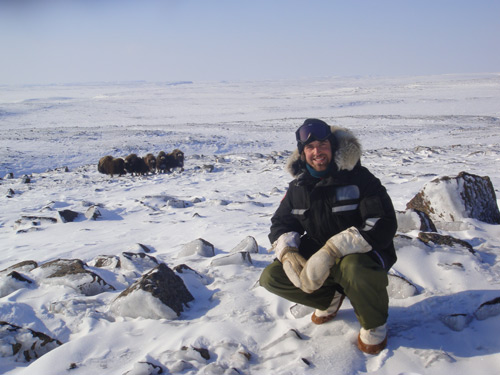
A tiny Arctic community has become Tristan Pearce’s second home.
The PhD student has been traveling to Ulukhaktok, Northwest Territories, for the past six years for research examining the implications of climate change for Inuit and their livelihood.
Despite the severe weather conditions, expensive yet modest accommodations and limited food selection, Pearce spends up to six months a year living in the northern village of about 400.
“I like the harshness of it all,” says the British Columbia native. “And the people there are so welcoming. I have basically been adopted by the community. “
It’s also a great place to do research, he adds.
“During the winter months, the temperature can drop below minus 30. It’s too cold and windy to hunt, so people will stay indoors and visit with each other. It’s a great window of time to conduct interviews.”
Pearce was 24 when he made his first trip to the community to conduct research for his master’s, and he continued to study the area for his PhD under geography professor Barry Smit. He was awarded a Vanier Scholarship from the Social Sciences and Humanities Research Council for his PhD research.
Although there are many researchers who travel north to study the effects of climate change, few have built relationships as has Pearce.
“So many researchers go up to this area, have great field experiments, but never come back,” he says. “The people of Ulukhaktok joke that they are like ground squirrels, because they come in the summer and leave. But I think having strong relationships can only benefit you when it comes to this type of research. It can take a lot of years for people to trust someone before they will share certain information about their culture or situation.”
Over the years, Pearce has learned from the people of Ulukhaktok how climate change is affecting them.
Inuit in Ulukhaktok live closely with the environment. Hunting and fishing provide food and are central to their identity, he says. In recent years, the ice has become more unstable and unsafe for travel. Thinner ice is also vulnerable to strong winds, which can form ice mounds and create obstacles for traveling. The warmer temperatures have also caused the permafrost to thaw and the ground to shift, making buildings unstable.
“There is more of a fear to travel because the conditions are unpredictable. Now the weather can change suddenly overnight. You may be camping out on the land in the spring and expect the temperature to stay cool enough for the snow to remain stable, but more often now temperatures are rising quickly and the snow is turning to slush. People become stuck because they can’t pull their sleds through it.”
These changing environmental conditions make it more important than ever for people to learn from their elders the navigation and hunting skills needed to find food and to travel, which was the focus of his latest research project.
Pearce examined how environmental knowledge and land skills are passed down to youth by interviewing elders and men between 18 and 50.
“I found that there is a cohort of younger men that haven’t had the opportunity to learn these skills and will enter their thirties and still not have these skills. This gap in knowledge can impact these men’s health and well-being in relation to not being productive members of society.”
Part of the reason for this gap is that today’s youth are in school or working and are less interested in hunting, he says. Some have not been taught the native language so cannot understand their elders, or they have lost their fathers to suicide ― a tragedy that is becoming increasingly common.
Skills such as reading sea-ice conditions or using the stars to travel in whiteout conditions are particularly important for adapting to extreme weather related to climate change, he says.
Although his PhD is almost complete, Pearce has no plans to end his visits to Ulukhaktok. He will return at the end of the summer to work on his current research project on adaptation action planning.
“Together with the community, we have identified many of the problems caused by climate change and now we need to find the right avenues to get to the solutions. I want to help create the missing link between the problems and solutions.”
In addition to his research goals, Pearce has developed friendships with the people of Ulukhaktok and can’t imagine ever cutting ties.
“I will always go back. Even when I am done my research, I will continue to go back.”